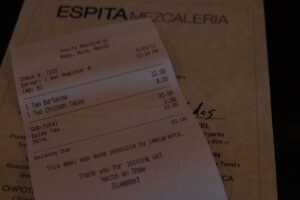Alexis Samayoa
“The Only Recipe Book for Mole is Somebody’s Grandmother in Mexico”: An Interview With Chef Alexis Samayoa
Meet Alexis Samayoa, owner of Espita Mezcaleria, a Southern Mexican-inspired restaurant & mezcaleria located in the Shaw neighborhood of Washington, DC. The establishment has developed a reputation for its moles (mole is a complex, savory sauce popular in Mexican cuisine). Interestingly, Samayoa himself is not Mexican–his father is from Guatemala, and his mother is from Puerto Rico. However, his Latin American heritage and upbringing definitely influence the way he thinks about food, the way he runs his restaurant, and the way he treats his immigrant employees.
Although he didn’t decide to become a chef until he was 19, Samayoa grew up helping his mother around the kitchen. The youngest of three children, he still remembers the flavors and cooking processes that his mother used at home, and those traditions inform the way he crafts recipes in his kitchen today. In his restaurant, he makes black beans exactly the way that his mother always made them, saying “I fell in love with them ever since I was a little kid.” He even took the liberty to share his recipe: “You have your black beans, poblano chiles, onions, garlic, avocado leaf. You puree it all up, you pour it in the hot oil, fry it off a little bit. Pour the black beans on top of it, cover it with water, and before you know it, you have these delicious beans.”
Growing up, dinner time was sacred in Samayoa’s household–when it came time to eat, the TVs would be turned off, homework would be stopped, everything would be put on hold until the meal was finished. Samayoa believes that in Latin American culture, food represents love, family, and appreciation. He said, “I don’t know if it’s just me, but most of the time when I eat or go to friend’s houses…it’s family thing. You know, you feel loved. Food is all about love and family.” That’s why his role as a chef is so important to him–because if he was not cooking in his own restaurant, he would be doing the same thing at his own house. He said, “I would gladly invite everybody over to my house if I had a big enough place to eat and hang out.”
Although he now owns a Mexican restaurant, his creative outlook on food perhaps originates from his mixed heritage. Every year, his family would flip a coin at Christmastime to determine whether Guatemalan food or Puerto Rican food would dominate the dining table. He said, “If it was my dad’s year, my dad would want these specific tamales from Guatemala, or if it was my mom’s year, we would have pasteles made out of yucca or plantains from Puerto Rico.”
His mother’s opinion of his cooking is obviously important to him, as she was the main cook in the house when he was growing up. Three years ago, he finally attempted to make the same pasteles that his mom always makes, simply from his memories of watching her make them. After he grated the yucca and plantains, folded the banana leaves, and finally cooked them and tasted them, he said his thoughts were, “I did it. This is exactly the way my mom did it.” He said he froze them and shipped them overnight to his mother, telling her that he had recently bought them. She called him the next day, saying, “You know, they were really good. Where did you buy them?” And he said, “No, mom, I’m lying, I made them. I just wanted to hear that I actually learned something from you after all of these years of watching you make them every Christmas.”
Samayoa’s restaurant, Espita Mezcaleria, has garnered a reputation for its moles, which Samayoa describes as a “hearty, thick flavored sauce…it’s complex, it gives flavor to flavor.” He said that people usually only expect one kind of mole, but when the restaurant opened, they had 8 moles available and now they have around 20. He also shared, “There’s no recipe book for moles. The only recipe book for mole is somebody’s grandmother in Mexico. She’s the only one that has it and it’s not even a recipe, it’s what she learned from generations before that.” However, Samayoa is frank about the fact that his moles aren’t exactly like “authentic” Mexican moles, saying that he has to cut corners in order to make gallons worth of mole every day as opposed to a cup’s worth. He shared that he doesn’t think that anything in the restaurant could be 100% percent authentic except for the mezcal, which is shipped directly to the restaurant from Mexico.
Because Samayoa isn’t Mexican, he keeps almost an entirely Mexican staff who serve as point of reference for him for the recipes that he develops. He says that when he develops a recipe, the only opinions he cares about are those of his Mexican staff. He shared that he would say to them, “This came from your country, this came from your culture. So tell me if I’m there or not there.” To provide an example of relying on the knowledge and intuition of his Mexican employees, he mentioned that a couple of weeks ago, he created a new kind of salsa nogal (walnut sauce) made with yogurt, white wine, and toasted walnuts. He gave it to one of his Mexican employees to try, and she said, “I think you could toast the nuts off a little more.” He threw out his original batch, made a completely new one, and had the same employee try it again. She said it was great, and he kept the batch as a reference for what it should taste like. He shared, “That’s the only committee about food I talk to, is them.”
Samayoa shared that he knows it is important to support immigrants because as the son of an immigrant, knows about the mistreatment that some immigrants go through, citing the fact that his dad worked for below minimum wage in up to three jobs at a time to support his family. He said, “I nurture everybody, I like to be as bipartisan as possible, I don’t like taking sides. This means a lot to me because of where I came from, how I grew up. I saw other families as a kid that also struggled, and I know what the struggle is.” Therefore, he treats his employees well, and his employees are happy–he pays them above minimum wage, and gives them days off when they ask for them. Several of Samayoa’s employees have been at the restaurant since it opened, a testament to the mutual respect shared between the chef and his staff.
The dining receipts that customers receive in Espita Mezcaleria read, “This meal was made possible by immigrants.” Samayoa chose to do this to send the message that he supports his crew, and he supports his people. He shared, “That means a lot, to stand up for everybody here. So that’s why we decided to put that on our checks. Does it get seen or mentioned a lot? No, but it makes me proud.”





#CELEBRATE IMMIGRANTS
We all know someone with an immigration experience or have an immigrant heritage story of our own. Join us to stay updated as we #CelebrateImmigrants across the country!

